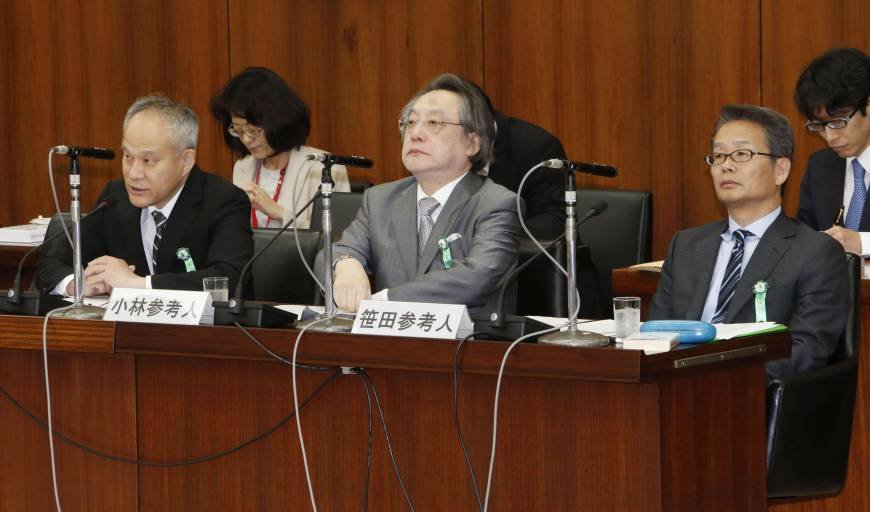This interview, titled (roughly) “Speak Out Against the ‘It Can’t Be Helped’ Way of Thinking”, was published in the August 10, 2015 issue of AERA, Japan’s highbrow weekly newsmagazine. It was a special issue devoted to the 70th Anniversary of the end of World War II. It unfortunately attributes some of the comments I made in relation to Article 9 of the Constitution, and how the public should respond to efforts of the current government to reinterpret that provision, to my views on Prime Minister Abe’s tendencies towards revisionist history.
Japan
Media Should Stop Legitimizing Abe’s Article 9 ‘Reinterpretation’
(Published in The Japan Times, Jun. 13, 2015).
Three of Japan’s preeminent constitutional law scholars testified on June 4 that the government’s recently tabled national security bills were unconstitutional. The proposed legislation is intended to implement the Cabinet resolution that purports to “reinterpret” the war-renouncing provision of the Constitution. The legal scholars’ testimony was greeted with apparent surprise in the media, as though it had not occurred to anyone until that moment that the draft bills might be unconstitutional.
The media reporting on the so-called reinterpretation has reflected a profound misunderstanding of the constitutional effect of the Cabinet resolution ever since it was issued last summer. The press has typically stated that the meaning of Article 9 had been “changed” or “revised” by the Cabinet resolution. That is simply wrong as a matter of law. It is important that the media understand that the Constitution was not amended or changed in any way by the Cabinet resolution, and that laws must continue to be judged against long established interpretations of Article 9. Otherwise, misleading and mistaken reporting on the issue could contribute to making an illegitimate attempt at reinterpretation a de facto amendment.
Re-Examining the ‘Myths’ About Japan’s Collective Self-Defense Change
(Co-authored with Bryce Wakefield – published in The Asia-Pacific Journal: Japan Focus, Sept. 8, 2014)
In a recent article in the Diplomat, Michael Green and Jeffrey Hornung claimed that critics of the Abe government’s “reinterpretation” of Japan’s constitution, to end the ban on the use of force for the purposes of collective self-defense, were “basing their opposition on myths about the change.” This allegation that resistance to the “reinterpretation” of Article 9 is based on nothing but “myths” is increasingly heard, and so it is worth examining their arguments, and the so-called myths that they purport to dismiss.
Green and Hornung argued that the changes to be made through the “reinterpretation” were actually slight and that the immediate implications were far less problematic than alleged. There is a grain of truth to this as it relates to imminent strategic consequences, but it also misses the essential point. Yes, at least in the short term, changes to the roles and the missions of the nation’s Self Defense Forces resulting from “reinterpretation” will probably be modest; and yes, the changes will not likely lead to militarism, regional adventurism, or various other scenarios that the article examines and dismisses. But this focus on the intended policy shifts misses the far more significant issues raised both by the unconstitutional nature of the move and the possible longer-term and profound systemic ramifications of the “reinterpretation.”
It is precisely because the immediate strategic implications of the Abe Cabinet’s announcement will probably be relatively modest that the implications for constitutional practice in Japan should be the focus of the debate. Perhaps the changing strategic environment in Asia will require Japan to consider relaxing some of the constraints imposed by Article 9. However, so fundamental a change to the nation’s constitution should only come after broad debate and pursuant to formal amendment procedures as provided for in the constitution. As explained below, the so-called “reinterpretation” process has in fact weakened constitutionalism, the rule of law, and fundamental principles of democracy in Japan, an argument that Green and Hornung, and many other defenders of the “reinterpretation”, never seriously address. In short, the harm is to the Constitution, and so focus on strategy is no answer.
Let us re-examine some of the “myths” that Green and Hornung so quickly dismiss.




